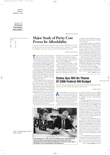A National Institutes of Health (NIH) panel reviewing the state of knowledge about insomnia treatments called for a wide range of research to elaborate the causes, mechanisms, course and consequences of, and treatments for chronic insomnia.
“We know `way too little about all these variables,'” said review panel chair Alan Leshner, Ph.D., chief executive officer of the American Association for the Advancement of Science. “That is why this was a state-of-the-science conference, not a consensus treatment conference,” he said. “Many gaps in the scientific literature need to be filled.”
Chronic insomnia is comorbid with a wide variety of medical conditions.“ It's not always clear which is causing which, a fact physicians need to know to target treatment,” Leshner said.
The panel called on the sleep community, NIH, and pharmaceutical manufacturers to conduct randomized, controlled, multisite clinical trials to see how pharmacological agents stack up against each other, placebo, and cognitive-behavioral therapy (CBT) and how well combined treatments work.
These studies, the panel said, should use validated objective and self-report measures of sleep function, wake function, and general health and quality-of-life indicators. They should include population subgroups with a high prevalence of insomnia and comorbid illness, such as postmenopausal women and nursing home residents, as well as groups for which knowledge of insomnia is sparse, such as children. Subjects should include people with primary chronic insomnia and comorbid insomnia, not simply normal controls. Trials should assess cost and cost-effectiveness.
The panel identified the need to carry out the following tasks:
•
Develop a central registry for all insomnia trial data.
•
Assess the efficacy of complementary and alternative-medicine therapies, preferably with federal support to assure rigorous research methodology.
•
Conduct longitudinal studies to identify factors that affect the incidence of insomnia and comorbidities—such as bereavement, divorce, and major chronic diseases—as well as the duration of insomnia.
•
Explore the possible genetic etiology of chronic insomnia.
•
Assess the public health burden of insomnia by including measures of sleep in epidemiological studies. To aid this goal, the 2005-2006 National Health and Nutrition Examination Survey will include 23 questions on sleep. Interviewers will ask subjects to report how long they take to fall asleep and how long they sleep, the nature of sleep problems they experience, and whether they have trouble with concentration, memory, work, driving, and other aspects of daily life because they feel too tired or sleepy. The panel urged that measures of sleep also be added to other epidemiological studies.
•
Identify direct and indirect costs of chronic insomnia and potential societal benefits, such as improved work and academic performance and higher quality of life, of successful intervention programs.
•
Assess the impact of chronic insomnia on families and caregivers, who may be forced to lose sleep themselves.
•
Train more specialists and primary care practitioners in CBT.
•
Study physician prescribing and decision-making behaviors.
•
Encourage primary care physicians and other health professionals to ask all patients about sleep in routine evaluations.
•
Educate the general public about sleep, sleep disorders, and health habits that contribute to good sleep.
The panel arrived at its recommendations after hearing two days of presentations on insomnia by sleep experts. In closed-door deliberations, it then considered comments from conference attendees and a review of scientific literature supplied by the Agency for Healthcare Research and Quality. Panel members lost some sleep themselves in the process: they completed their draft report at 3:15 a.m.
The 12-member multidisciplinary panel included Charles Zorumski, M.D., chair of psychiatry, and Lee Robins, Ph.D., emeritus professor of social science in psychiatry, both at Washington University School of Medicine in St. Louis. The National Institute of Mental Health and Office of Medical Applications of Research were the lead sponsors of the conference.
